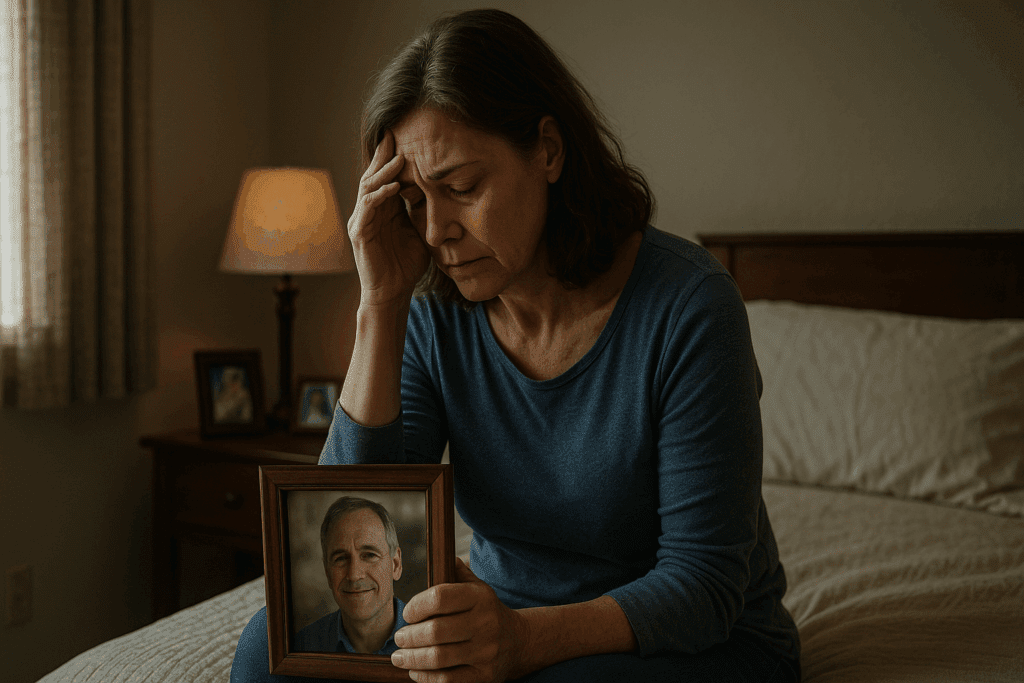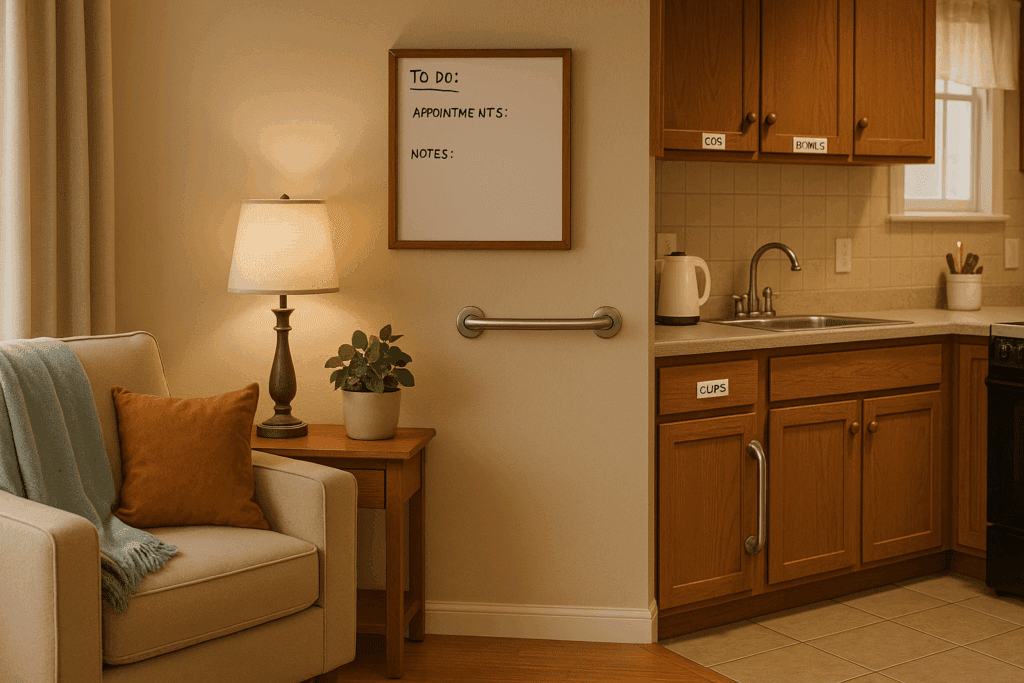Caring for a loved one with dementia can be one of the most emotionally demanding and financially challenging experiences a person may face. When the person suffering from cognitive decline is a spouse, the sense of responsibility becomes deeply personal, layered with grief, confusion, and a relentless commitment to their well-being. For many spouses who find themselves asking, “My husband has dementia, what help can I get?” the path forward can feel uncertain and isolating. However, knowing how to get free care for dementia patients is crucial, and a wide range of resources exists to support caregivers and families in navigating this complex journey.
You may also like: How to Prevent Dementia and Alzheimer’s Disease Naturally: Expert-Backed Strategies to Reduce Your Risk Through Lifestyle and Diet
Understanding Dementia and Its Progression
Dementia is not a single disease but a collection of symptoms that affect memory, thinking, and social abilities severely enough to interfere with daily functioning. Alzheimer’s disease is the most common cause, but other types, such as vascular dementia, Lewy body dementia, and frontotemporal disorders, also contribute to the broader dementia spectrum. Each form of dementia has its own trajectory and nuances, but all tend to progress over time, often shifting from mild forgetfulness to severe cognitive impairment that may ultimately impact mobility, speech, and the ability to perform even the simplest tasks.
The burden on a spouse can become overwhelming as dementia progresses. In the early stages, your husband might still be able to engage in everyday tasks, but subtle changes in personality, attention span, or memory may begin to appear. As the condition advances, full-time supervision and care become necessary, and this transition can be emotionally painful as well as logistically complex. Knowing where to find free care for dementia patients and how to access support services becomes crucial for sustaining both your spouse’s well-being and your own.

Recognizing the Emotional Toll of Spousal Caregiving
When your partner is diagnosed with dementia, the relationship inevitably shifts. You may find yourself grieving the loss of the person you once knew, even while they are physically present. This phenomenon, often referred to as “ambiguous loss,” is common among dementia caregivers. It can lead to feelings of sadness, frustration, and guilt, particularly when the day-to-day demands become increasingly intense.
Spousal caregivers are particularly susceptible to caregiver burnout, a state of physical, emotional, and mental exhaustion caused by prolonged caregiving. Stress may manifest as sleep disturbances, anxiety, depression, or physical illness. The chronic nature of dementia caregiving requires long-term resilience, which is difficult to sustain without professional help or social support. When faced with the question, “My husband has dementia, what help can I get?” seeking emotional and psychological support should be just as much a priority as securing physical care.

Navigating Free and Low-Cost Care Resources
Fortunately, families are not entirely alone in this journey. There are numerous avenues for obtaining free care for dementia patients, though the availability of services may vary depending on geographic location, eligibility criteria, and the stage of the disease. Some of the most widely accessible options include programs funded by federal and state governments, non-profit organizations, and community-based initiatives.
Medicaid is often the most reliable source of free care for dementia patients. Through Medicaid Home and Community-Based Services (HCBS) waivers, eligible individuals can receive in-home care, adult day health services, respite care, and even some forms of assisted living. Each state has its own Medicaid eligibility rules, so contacting your local Medicaid office can help determine what services are available to you and your spouse.
The Program of All-Inclusive Care for the Elderly (PACE) is another comprehensive care option that may be available in your area. PACE covers medical, social, and long-term care services for older adults who qualify for nursing home-level care but prefer to remain in their community. Enrollment in a PACE program can provide your husband with access to coordinated, interdisciplinary care teams that include physicians, nurses, therapists, and social workers.
Accessing Nonprofit and Community-Based Support
Beyond government assistance, numerous nonprofit organizations offer valuable resources, including free care for dementia patients or heavily subsidized services. The Alzheimer’s Association, for instance, provides a 24/7 helpline, care consultations, and links to local support groups and services. The organization’s network of chapters throughout the United States can connect you with educational workshops, respite programs, and legal and financial planning assistance.
Faith-based groups, senior centers, and volunteer caregiving coalitions often step in to fill the gaps in public and private services. Many community programs offer meal delivery, transportation to medical appointments, and friendly visiting services that provide much-needed social interaction for dementia patients while giving caregivers a short but meaningful break.
Adult day care centers are another overlooked but critical resource. These centers provide supervised care in a group setting during daytime hours and often include structured activities, meals, and therapeutic services. Many centers offer sliding-scale fees or are partially funded by community grants, making them more affordable or even free for eligible families.

Exploring Respite Care Options for Caregiver Relief
One of the most pressing needs for spouses caring for loved ones with dementia is regular relief. Respite care provides temporary, short-term assistance to allow caregivers time to rest, attend to personal needs, or handle other obligations. It can be offered in the home, at adult day care centers, or in residential care facilities for overnight stays.
Free respite care may be available through the National Family Caregiver Support Program (NFCSP), which helps caregivers of adults aged 60 or older. Services include in-home help, access to information and referral resources, and counseling. Many Area Agencies on Aging (AAAs) administer these programs at the local level and can provide detailed information about respite options and funding assistance.
Additionally, local Alzheimer’s associations or dementia advocacy groups may offer respite vouchers or volunteer-based in-home care to temporarily relieve primary caregivers. These programs can be lifesaving for those constantly wondering, “My husband has dementia, what help can I get to simply catch my breath?” It’s important to proactively schedule respite breaks to maintain your own mental and physical health over the long term.
Understanding Veteran Benefits and Specialized Programs
If your husband is a U.S. military veteran, the Department of Veterans Affairs (VA) offers a variety of programs specifically designed to support veterans with dementia and their caregivers. The VA’s Aid and Attendance benefit provides additional monthly income for veterans who need assistance with daily activities, which can be applied toward the cost of in-home care, assisted living, or nursing home care.
In addition, the VA offers Adult Day Health Care centers, home-based primary care, and respite care services through its nationwide network of medical centers and community-based outpatient clinics. Veterans enrolled in the VA health care system may also be eligible for the Comprehensive Assistance for Family Caregivers program, which provides a monthly stipend, training, and mental health services for spouses acting as full-time caregivers.
Understanding how to navigate these benefits can be challenging, but most VA hospitals have social workers or Veteran Service Officers (VSOs) who can guide you through the application process. Their assistance can be invaluable in identifying free care for dementia patients and maximizing the support available to your family.

Legal and Financial Planning for Long-Term Care
As dementia is a progressive condition, planning for future needs becomes a critical component of responsible caregiving. While many families are understandably focused on the present, anticipating the financial and legal implications of the disease is essential for ensuring continuity of care. Legal planning includes establishing powers of attorney, health care proxies, and advance directives that respect your husband’s wishes even as he loses the ability to make decisions independently.
Consulting with an elder law attorney can help protect assets and identify pathways to qualify for public benefits without depleting life savings. In some cases, transferring certain assets or setting up a Medicaid-compliant trust can help preserve financial stability while accessing needed services. It’s also essential to keep detailed records of care expenses, as these may be tax-deductible or reimbursable under certain benefit programs.
Financial counselors or case managers affiliated with hospitals, senior centers, or nonprofit organizations may also assist with creating sustainable budgets and locating additional funding sources. Understanding your options in advance will alleviate the uncertainty that often arises when spouses face the daunting question: “My husband has dementia, what help can I get now—and what will I need later?”

The Role of Support Groups and Mental Health Counseling
Caregiving can be an isolating experience, particularly when dealing with the unique challenges of dementia. Connecting with others who understand your journey can make an enormous difference in your emotional well-being. Support groups, whether in-person or online, offer a safe space to share stories, exchange tips, and gain encouragement.
Many Alzheimer’s associations, senior centers, and mental health organizations sponsor regular caregiver support groups facilitated by trained professionals. These sessions provide not only emotional relief but also practical insights that can improve caregiving strategies and coping mechanisms. In addition to peer support, individual counseling may be beneficial, especially for managing caregiver stress, anxiety, or depression.
Mental health services are increasingly recognized as a core component of dementia care. Some insurance plans, including Medicaid and Medicare, cover therapy sessions or psychiatric consultations for caregivers. Employers may also offer Employee Assistance Programs (EAPs) that provide confidential counseling and referral services. Taking care of your own emotional needs is not a luxury—it’s a necessity, especially when you are the primary source of support for someone with a deteriorating condition.

Adapting the Home Environment for Dementia Care
Many families wish to care for their loved ones at home for as long as possible. Doing so requires thoughtful modifications to create a safe and supportive environment that accommodates the unique needs of a person with dementia. These adaptations can range from simple changes—like labeling cabinets and installing grab bars—to more comprehensive adjustments such as setting up memory care-friendly furniture or using electronic monitoring devices.
Home safety evaluations conducted by occupational therapists can provide customized recommendations to reduce fall risks, prevent wandering, and improve the overall livability of your space. Some community programs or insurance plans offer funding or reimbursement for these assessments. Assistive technology, including GPS trackers, medication reminders, and emergency alert systems, can also provide peace of mind to caregivers juggling multiple responsibilities.
Home-based dementia care may also benefit from the services of visiting nurses, home health aides, and therapists. While not always covered in full, many of these services are eligible for partial or full coverage under Medicaid, Medicare (with a physician’s order), or veterans’ benefits. Leveraging these options helps provide free care for dementia patients while maintaining a high quality of life in familiar surroundings.
Maintaining Quality of Life Through Therapeutic Activities
Although dementia imposes many limitations, it’s important to remember that people living with this condition still benefit greatly from meaningful engagement. Activities tailored to your husband’s abilities and interests can boost mood, reduce agitation, and preserve dignity. Music therapy, art projects, reminiscence exercises, and gentle physical movement such as walking or chair yoga are all examples of therapeutic activities that promote well-being.
Incorporating daily routines with predictable structure also supports cognitive function and emotional stability. Working with a dementia care specialist or geriatric therapist can provide personalized activity plans that evolve as the disease progresses. Many nonprofit and academic institutions offer free or low-cost therapeutic programming designed specifically for dementia patients, providing another avenue for holistic care without financial burden.
Frequently Asked Questions: Free Care for Dementia Patients and Spousal Support Resources
1. What are some lesser-known sources of free care for dementia patients that families might overlook?
In addition to well-known programs like Medicaid and the VA, there are many underutilized community initiatives that provide free care for dementia patients. For example, local universities with medical or social work programs often run student-led clinics or senior outreach initiatives that offer complimentary in-home assessments or cognitive therapy workshops. Libraries and community recreation centers may partner with nonprofits to host dementia-friendly events and caregiver training sessions. Moreover, municipal or county aging services frequently run pilot programs that provide home health services or transportation for dementia patients at no cost. Exploring these hyperlocal options can expand access beyond the usual resources.
2. My husband has dementia—what help can I get if I’m still working full-time?
Balancing a career with caregiving can feel impossible, but there are workplace and policy-based solutions that can help. Employers covered under the Family and Medical Leave Act (FMLA) must allow up to 12 weeks of unpaid leave to care for a spouse with a serious medical condition like dementia. Some progressive companies also offer caregiver-specific employee benefits, including flexible hours, caregiver support groups, or referrals to geriatric care managers. Additionally, you may qualify for financial help through the National Family Caregiver Support Program or your state’s respite voucher system. Asking, “My husband has dementia, what help can I get while maintaining my career?” often starts with examining workplace protections and integrating professional caregiver support when you’re away.
3. Are there programs that support dementia caregivers emotionally, not just practically?
Yes, many programs focus specifically on the emotional and psychological burden of caregiving. Nonprofits like the Rosalynn Carter Institute for Caregivers and local mental health coalitions offer free virtual therapy sessions and resilience-building workshops tailored to dementia spouses. Caregivers can also access online mindfulness groups and peer-led communities through platforms like CaringBridge or The Mighty, which focus on the lived experience of caregiving. Recognizing that emotional health is as critical as practical support is key, especially when you’re asking, “My husband has dementia, what help can I get that supports me too?” Free care for dementia patients doesn’t only mean physical assistance—it includes caring for the caregiver’s inner world.
4. What tech innovations can help reduce the need for round-the-clock supervision at home?
Smart-home technology has made it more feasible to care for someone with dementia at home without constant supervision. GPS-enabled wearables can alert caregivers if a loved one wanders too far, while smart sensors detect movement patterns and send alerts if something is amiss. There are also devices that dispense medication on a schedule and notify caregivers if a dose is missed. Some services provide remote video check-ins or virtual companions that can engage dementia patients with conversation or music therapy. Leveraging these innovations is one way to extend the reach of free care for dementia patients while reducing the immediate demand on family members.
5. Can I be compensated as a caregiver if my husband has dementia? What help can I get financially?
Yes, in many states, spouses can be paid caregivers through Medicaid Consumer-Directed Services (CDS) or similar self-directed care programs. These models allow dementia patients to select their caregivers, which can include spouses in some jurisdictions. Additionally, veterans’ benefits like the VA’s Comprehensive Assistance for Family Caregivers program may provide a monthly stipend. You may also be eligible for tax deductions or credits related to medical expenses and home modifications. When exploring the question, “My husband has dementia, what help can I get financially?” it’s essential to speak with a local benefits counselor who can tailor advice to your situation and maximize compensation options.
6. How can caregivers advocate for better public access to free care for dementia patients?
Becoming an advocate can start locally by participating in city council meetings, joining dementia advocacy networks, or contacting state legislators. National organizations like the Alzheimer’s Impact Movement and UsAgainstAlzheimer’s provide templates for emails, talking points for phone calls, and training for caregiver advocates. Sharing your story through media outlets or speaking at public forums can also humanize the need for expanded caregiver support programs. Your lived experience—especially if you’re navigating questions like “My husband has dementia, what help can I get when resources fall short?”—can help influence policy and drive funding toward free care for dementia patients.
7. What are the signs that it may be time to transition from home care to a facility?
This decision is deeply personal and often difficult, but certain signs suggest that home care may no longer be safe or sustainable. These include frequent wandering incidents, increased falls, aggression, incontinence that cannot be managed at home, or caregiver exhaustion that jeopardizes both parties’ health. If you’re constantly overwhelmed and find yourself repeatedly thinking, “My husband has dementia, what help can I get that goes beyond what I can offer?” it may be time to explore memory care facilities that accept Medicaid or offer subsidized rates. Many nonprofit memory care units also participate in sliding scale programs, providing affordable or even free care for dementia patients who need residential support.
8. How can I ensure my husband’s care preferences are respected as the disease progresses?
Advance care planning is essential to preserving autonomy. Legal tools like a durable power of attorney and a living will should be established early. Beyond formal documents, consider writing a personal care plan that details your husband’s preferences on daily routines, spiritual practices, or food choices—information that’s often overlooked but profoundly impacts quality of life. When wondering, “My husband has dementia, what help can I get to make sure his voice is heard later?” remember that planning ahead is one of the most loving forms of advocacy. These measures also help professionals and institutions deliver care that aligns with your loved one’s identity.
9. Are there dementia-friendly housing communities that offer partial or free care for residents?
Yes, dementia-friendly housing is a growing model that emphasizes supportive design, peer engagement, and subsidized services. These intentional communities may be run by nonprofit organizations, municipalities, or religious institutions, offering shared housing or independent living units with access to meal services, transportation, and activity coordination. Some programs are funded by HUD or community development grants, which can make them accessible to lower-income families. Asking, “My husband has dementia, what help can I get that doesn’t involve institutionalization?” may lead you to discover creative alternatives to traditional nursing homes that still offer free care for dementia patients in a safe, dignified setting.
10. What role does personalized dementia training play in improving in-home care?
Many caregivers are unaware that free or low-cost dementia care training is available through local Alzheimer’s chapters, hospital systems, or online universities. These programs teach de-escalation techniques, communication strategies, and care routines that reduce stress for both patient and spouse. Personalized training can also address cultural sensitivities or unique family dynamics that generalized programs miss. By participating in structured training, you gain confidence and reduce the trial-and-error burden of daily care. If you’ve ever asked, “My husband has dementia, what help can I get that empowers me directly?” this kind of tailored education can be transformative, especially when paired with access to ongoing mentorship or coaching.
Conclusion: Building a Supportive Network and Finding Free Care for Dementia Patients
Facing the cognitive decline of a spouse is never easy, but no one should have to do it alone. When you’re wondering, “My husband has dementia, what help can I get?” the answer lies in a multifaceted approach that includes accessing free care for dementia patients, building community connections, prioritizing mental health, and preparing for future needs. While the journey is filled with emotional complexities, it is also one marked by resilience, advocacy, and love.
By taking proactive steps to understand available resources—ranging from Medicaid waivers to respite care, from veteran programs to support groups—you can significantly alleviate the emotional and financial pressures of caregiving. Knowledge, preparation, and support are your most powerful allies. With them, you can continue to care for your husband with dignity and compassion while protecting your own well-being.
In the end, the most sustainable caregiving comes from a place of balance, not sacrifice. Through intentional planning, community engagement, and the strategic use of available services, families can navigate the dementia journey with grace and confidence. Embracing the support that exists allows caregivers not only to endure but to thrive, ensuring that both patient and partner are upheld throughout every stage of the disease.
caregiver support services, dementia spouse resources, home safety for dementia, community programs for Alzheimer’s, financial aid for caregivers, elder law planning, dementia-friendly housing, memory care options, support groups for caregivers, managing dementia at home, assistive technology for dementia, emotional support for spouses, government help for caregivers, dementia advocacy tools, caregiver mental health resources, VA dementia benefits, non-medical dementia care, caregiver stress relief, long-term dementia planning, therapeutic activities for dementia
Was this article helpful? Don’t let it stop with you. Share it right now with someone who needs to see it—whether it’s a friend, a colleague, or your whole network. And if staying ahead on this topic matters to you, subscribe to this publication for the most up-to-date information. You’ll get the latest insights delivered straight to you—no searching, no missing out.
Further Reading:
Improving Outcomes for Individuals Living with Dementia
Improving the quality of life for patients with dementia and their caregivers


